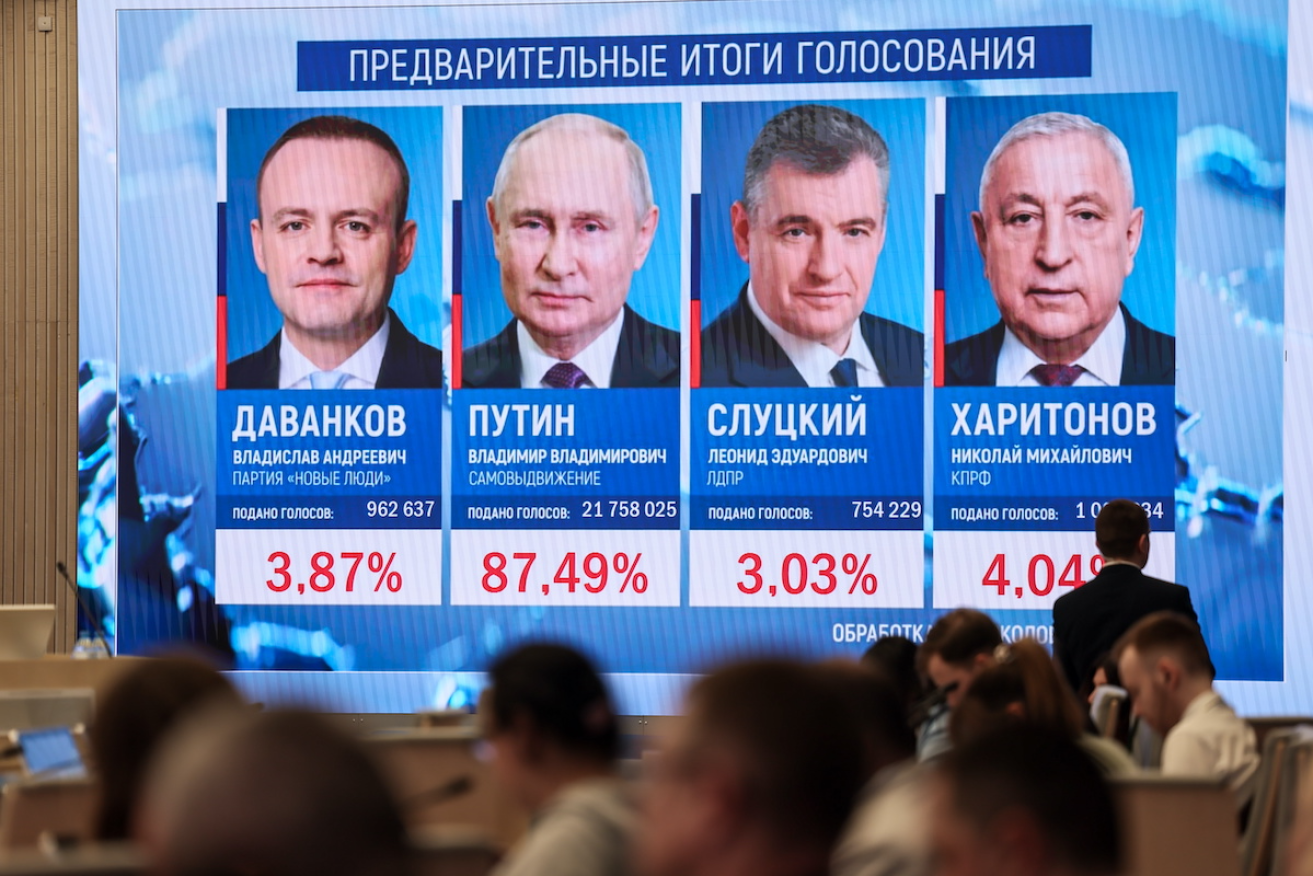For Putin, a former KGB lieutenant colonel who first rose to power in 1999, the result is intended to underscore to the rest of the world that its leaders will have to reckon with an emboldened Russia, whether in war or in peace, for many more years to come.
The early result means Putin, 71, will easily secure a new six-year term that would enable him to overtake Josef Stalin and become Russia’s longest-serving leader for more than 200 years.
Putin won 87.8 per cent of the vote, the highest ever result in Russia’s post-Soviet history, according to an exit poll by pollster the Public Opinion Foundation (FOM).
The Russian Public Opinion Research Centre (VCIOM) put Putin on 87 per cent.
First official results indicated the exit polls were accurate.
“The elections are obviously not free nor fair given how Mr Putin has imprisoned political opponents and prevented others from running against him,” the White House’s National Security Council representative said.
The election comes just over two years since Putin triggered the deadliest European conflict since World War II by ordering the invasion of Ukraine.
He casts it as a “special military operation”.
War has hung over the three-day election: Ukraine has repeatedly attacked oil refineries in Russia, shelled Russian regions and sought to pierce Russian borders with proxy forces – a move Putin said would not be left unpunished.
While Putin’s re-election was not in doubt given his control over Russia and the absence of any real challengers, the former KGB spy wanted to show that he has the overwhelming support of the public.
Turnout across Russia was 74.22 per cent as the polls closed, election officials said, surpassing 2018 levels of 67.5 per cent
None of Putin’s three rivals – veteran Communist Nikolai Kharitonov, ultranationalist Leonid Slutsky and Vladislav Davankov, deputy chairman of the lower house of parliament and candidate for the New People party – received more than four per cent of the vote, early results indicated.
Supporters of Putin’s most prominent opponent, Alexei Navalny, who died in an Arctic prison last month, had called on Russians to come out at a “Noon against Putin” protest to show their dissent against a leader they describe as a corrupt autocrat.
There was no independent tally of how many of Russia’s 114 million voters across the country’s 11 time zones took part in the opposition demonstrations, amid extremely tight security involving tens of thousands of police and security officials.
Reuters journalists saw an increase in the flow of voters, especially younger people, at noon at polling stations in Moscow, St Petersburg and Yekaterinburg, with queues of several hundred people and even thousands.
Some said they were protesting although there were few outward signs to distinguish them from ordinary voters.
At least 74 people were arrested on Sunday across Russia, according to OVD-Info, a group that monitors crackdowns on dissent.
Over the previous two days, there were scattered incidents of protest as some Russians set fire to voting booths or poured green dye into ballot boxes.
Opponents posted some pictures of ballots spoiled with slogans insulting Putin.
Opposition politician Boris Nadezhdin, who was removed from the ballot in his effort to challenge Putin, took part in the midday protest in Moscow.
Nadezhdin was received with cheers from students at a polling place on the campus of the Moscow Institute of Physics and Technology, as a video he posted on Telegram showed.
His goal, he said, was for his Citizens’ Initiative party to win the upcoming parliamentary elections.
Nadezhdin caused a stir in January when thousands of Russians queued up to sign his petition to get on the ballot.
Nadezhdin, 60, said he was able to collect twice the required 100,000 signatures but the Kremlin-controlled election commission excluded him.
They said there were too many incorrect signatures.
Ukrainian President Volodymyr Zelenskiy said on Sunday that Putin wanted to rule forever.
“There is no legitimacy in this imitation of elections and there cannot be. This person should be on trial in The Hague. That’s what we have to ensure,” he said.
Putin portrays the Ukraine war as part of a centuries-old battle with a declining and decadent United States and its NATO allies that he says humiliated Russia after the Cold War by encroaching on Russia’s sphere of influence.
– AAP





